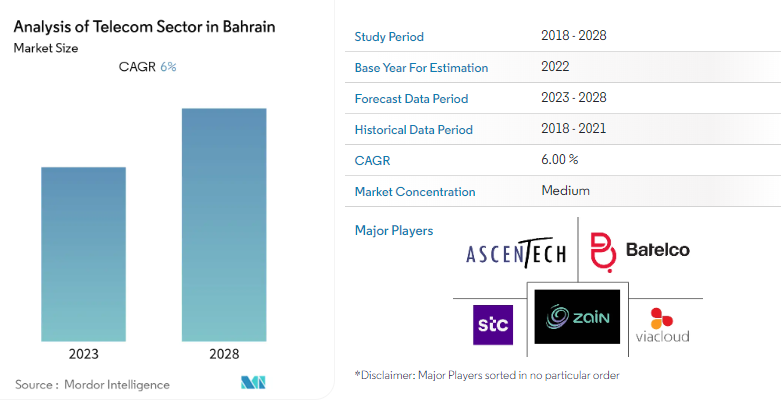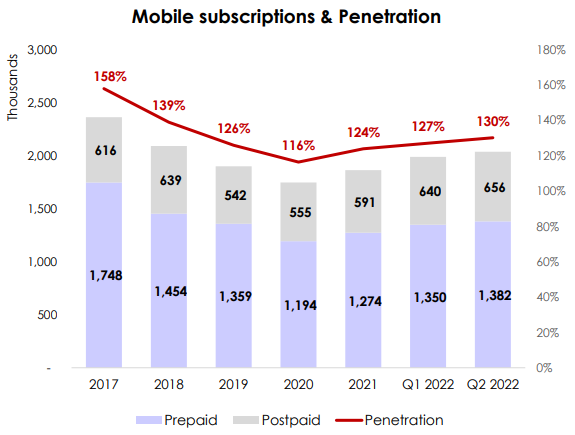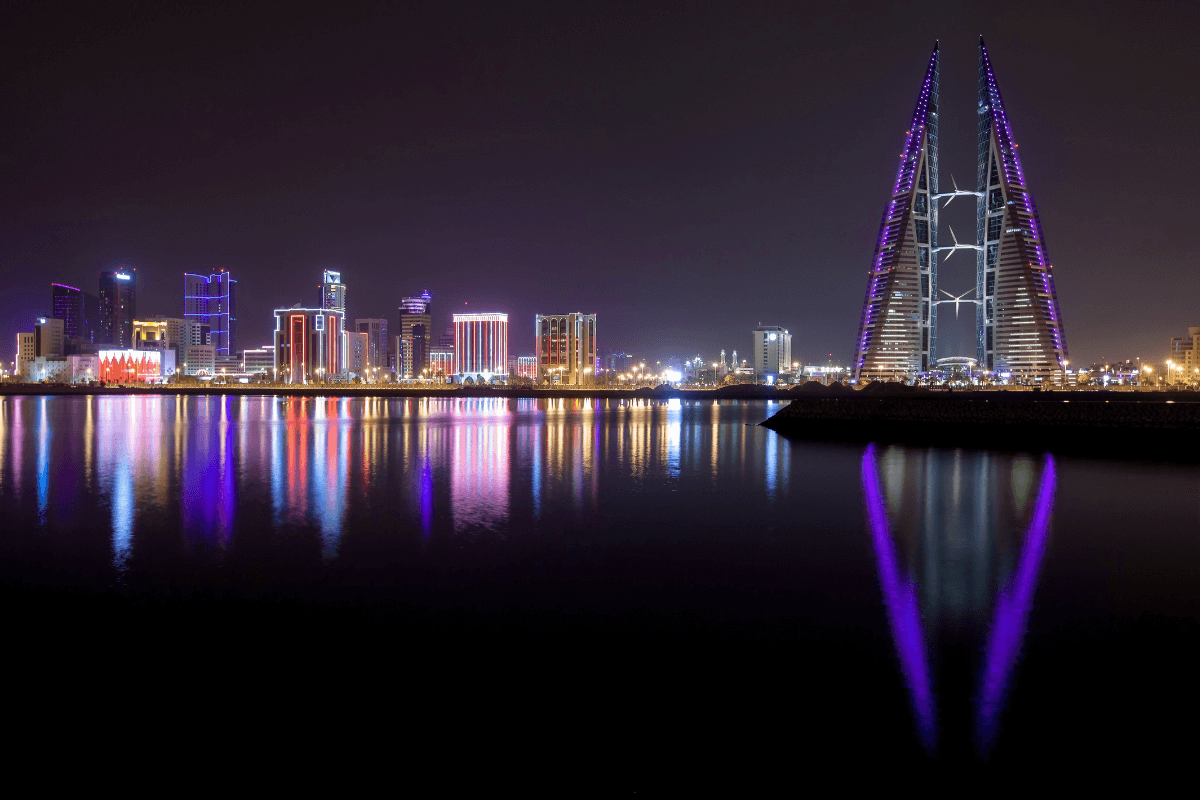Bahrain has emerged as a key player in the Middle Eastern telecom landscape. The country’s strategic efforts and initiatives, particularly the Economic Vision 2030, have positioned it at the front of digital transformation. As part of its long-term Economic Vision 2030 strategy, Bahrain is actively reforming its telecom sector, with the primary aim of digital transformation across various key sectors including e-government, e-health, e-commerce, and e-banking. Bahrain has shown remarkable agility and penchant for adopting new technologies, evidenced by its rapid adoption of 5G and its continuous investment in expanding the broadband connectivity.
This blog delves into the intricacies of Bahrain’s telecom sector, exploring its amazing evolution, current state, and future prospects. It’s an exciting world where cutting-edge technology meets strategic economic plans. So, buckle up as we explore how this small island nation is making big waves in the Middle Eastern telecom arena.
Bahrain’s Telecom Sector: The Current Picture
Economic Significance
Guess what? Bahrain’s telecom market is booming! Valued at $422.5 million in 2022 and expected to grow at a 6% CAGR through 2028. This sector is indeed buzzing. Thanks to government initiatives and a tech-savvy population, Bahrain is not just riding the digital wave; it’s leading it.

Government Initiatives
Here’s the cool part – the government isn’t just watching from the sidelines. They’re actively investing in digital infrastructure, pushing for 5G adoption, and creating a growth-friendly environment. It’s like setting the stage for an epic tech show, and everyone’s invited.
Market Dynamics
High mobile penetration rates and competitive tariffs – that’s Bahrain’s telecom market for you. It’s a scene where affordability meets technology, making sure everyone stays connected.
Case Study Download: How Avisys Transformed Fiber Order Fulfilment for Bahrain’s Telecom Powerhouse
Regulatory Environment
The Bahrain Telecommunications Regulatory Authority (TRA) is the unsung hero here. They’re ensuring a level playing field, promoting investment, and making sure consumers get top-notch services.
Infrastructure Development
5G and fiber-optic networks are the buzzwords in Bahrain’s telecom infrastructure. The nation is laying the digital foundations for a future that’s faster, smarter, and more connected.
The Role of Telecom in Bahrain’s Economic Vision 2030
Bahrain’s Economic Vision 2030 isn’t just a plan; it’s a digital transformation blueprint. It’s about integrating technology into every sector – from e-government to e-commerce – and telecom is at its heart.
Bahrain is a forerunner in digital transformation, pioneering early telecom liberalization and robust ICT infrastructure. This includes setting IoT standards and adapting to 5G. The telecom sector underpins key areas:
- e-Government: Enhancing accessibility and efficiency of government services through digital platforms.
- e-Health: Driving telemedicine and electronic health records, improving healthcare accessibility.
- e-Commerce and e-Banking: Facilitating online business growth and digital banking, including FinTech, supported by high-speed internet.
- Broadband Dominance: Leading with high-speed data services, Bahrain sees a surge in broadband usage.
- Smart City Initiatives: Imagine cities where everything is interconnected – from traffic lights to utility services. That’s where Bahrain is headed with its smart city initiatives, leveraging telecom infrastructure for a smarter living experience.
In aligning with global trends, Bahrain adopts technologies like 5G and AI, focusing on smart city development for better urban management. Collaborative efforts in public-private partnerships and international cooperation are vital for innovation and technology integration, advancing Bahrain’s Economic Vision 2030.
Navigating Through COVID-19
The telecom sector in Bahrain faced significant hurdles during the COVID-19 pandemic. Initially, the pandemic caused disruptions in supply chains and production, leading to hardware shortages and delays in infrastructure development. Despite these challenges, the sector showcased exceptional adaptability, swiftly adapting to the changing circumstances and maintaining continuous service delivery.
Digital Transformation Acceleration
- Fast-Tracking Digital Initiatives: The COVID-19 pandemic acted as a catalyst for accelerating digital transformation initiatives within the telecom sector in Bahrain. Projects that were in the pipeline, such as the expansion of fiber-optic networks and the rollout of 5G, gained new priority and pace.
- Innovative Solutions: Telecom operators introduced innovative solutions to meet the changing needs of customers. This included offering flexible data plans, enhancing mobile payment options, and providing special packages for remote working and e-learning.
Looking Ahead: Challenges and Opportunities
Challenges
- Network and Coverage: Achieving uniform network coverage, especially in remote areas. Bridging the digital divide and ensuring that rural and underserved communities receive dependable telecom services is crucial.
- Cybersecurity Concerns: As digital dependency grows, so does the importance of cybersecurity. It’s vital to safeguard the extensive data flowing through networks from cyber threats and protect user privacy to maintain trust in telecom services.
- Overcoming Market Saturation: Bahrain’s telecom market is grappling with high mobile usage rates, leading to saturation. This situation demands that operators innovate and diversify their services to keep growing and retain customer engagement.

(Source: Telecommunications Regulatory Authority – Bahrain)
- Regulatory Compliance: Keeping up with changing regulations in areas like data protection, consumer rights, and fair competition is a significant challenge. Telecom operators must be agile and actively engage with regulatory authorities to navigate these requirements.
- Telecom OSS and BSS Modernization: A key challenge is updating Operational Support Systems (OSS) and Business Support Systems (BSS). As the sector advances with new technologies, telecom OSS and BSS modernization is essential for efficient operations, effective billing and customer service, and seamless integration of new services.
Opportunities
- 5G and IoT Integration: The rollout of 5G networks creates exciting prospects for innovative IoT applications across various industries, enhancing efficiency and service quality.
- Growth in Digital Services: The surging demand for digital services, including e-health, e-education, and e-commerce, presents considerable growth opportunities for telecom operators.
- Global Tech Partnerships: Collaborating with international tech firms and infrastructure developers can introduce new technologies and investments into Bahrain’s telecom sector.
- Content and Media Ventures: The growing trend of OTT streaming and digital content consumption offers telecom operators new paths in content creation and distribution.
- Eco-Friendly Tech Initiatives: The telecom sector has the chance to invest in sustainable technologies and practices, contributing to environmental conservation.
- Workforce Development and Jobs: The expansion of the telecom sector provides opportunities for skill development and job creation, especially in new telecom technologies.
- Leveraging Data Analytics and AI: Employing data analytics and AI can significantly improve service delivery, customer experience, and operational efficiency, leading to customized services and predictive maintenance.
The Future: Infrastructure Development and Potential Impact
Economic Growth
- Boosting GDP: The expansion of the telecom sector, especially through 5G and fiber-optic network advancements, is expected to make a significant contribution to Bahrain’s GDP. This growth will stem from enhanced connectivity, better infrastructure, and the resulting uplift in various economic areas.
- Facilitating Business Growth: Improved telecom services are set to enable broader business development. Reliable, fast internet will help businesses increase efficiency, venture into new markets, and embrace innovative business models.
Fostering Innovation and Entrepreneurship
- Cultivating a Tech Startup Environment: A strong telecom sector provides the perfect ground for innovation and entrepreneurship, particularly in tech-focused domains. Better connectivity and digital infrastructure are key to nurturing tech startups, promoting an atmosphere of innovation, employment and tech progression.
- Backing Digital Transformation: The growth of the telecom sector is in sync with Bahrain’s Economic Vision 2030, aiding digital transformation in various fields. This paves the way for creative solutions in e-government, e-health, e-commerce, and e-banking, aligning with the nation’s broader digital goals.
Wrapping It Up
In a nutshell, Bahrain’s telecom sector is not just about calls and texts. It’s a cornerstone of the nation’s digital transformation journey. With a proactive government, a forward-thinking regulatory authority, and a commitment to innovation, Bahrain is set to be a beacon of digital advancement in the region.
So, if you’re as excited about Bahrain’s telecom future as we are, stay tuned. The best is yet to come!
Contact Avisys: Your Partner in Telecom Transformation
Got questions or need expert guidance in telecom transformation? Reach out to our telco transformation expert at info@avisys.in Web: www.avisysservices.com



